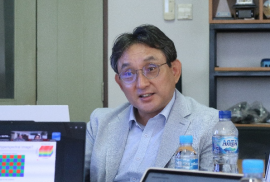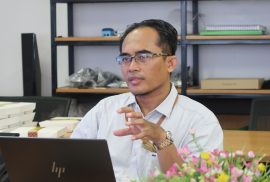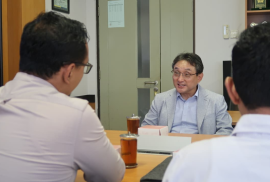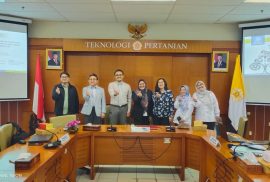
Bali, October 26, 2025 — Coffee is one of Indonesia’s leading agricultural commodities with significant strategic value. Beyond being part of daily culture and social habits, coffee also represents a major economic potential for farmers and local industries. Recognizing its importance, the Department of Agricultural and Biosystems Engineering (DTPB), Faculty of Agricultural Technology, Universitas Gadjah Mada (FTP UGM) collaborated with Ciputra University, Surabaya, in a joint research activity under the Flagship Collaborative Research Program (RIKUB) initiated by the Ministry of Higher Education, Science, and Technology (Kemdiktisaintek).
The RIKUB program is designed to support inter-institutional research collaborations that produce tangible innovations and deliver direct impact to society and industry. In this program, the UGM and Ciputra University research teams carried out a study titled “Sustainability Strategies and the Application of Technology as Drivers of Innovation and Efficiency in the Small and Medium-Scale Coffee Industry.”
Strategic Collaboration to Strengthen the Coffee Industry
From UGM, the research team consisted of Dr. Joko Nugroho Wahyu Karyadi, Dr. Makbul Hajad, Dr. Ansita Gupitakingkin Pradipta, and Dr. Dwi Ayuni.
Meanwhile, the Ciputra University team was represented by Yoseva Maria Pujirahayu, Dr. Teofilus, and Dr. Fahrul Riza.
The two institutions worked together to integrate agricultural technology approaches with sustainable business innovation to strengthen Indonesia’s coffee industry.
The field research was conducted over two days, October 25–26, 2025, across several coffee-producing sites in Bali, focusing on understanding coffee processing and business practices among farmers and small- to medium-scale entrepreneurs.
Insightful Discussion with Coffee Industry Stakeholders

The first day began with a Focus Group Discussion (FGD) involving coffee entrepreneurs from Bali and Bajawa. The session aimed to explore business practices, challenges, and opportunities for implementing sustainable innovations within local and national coffee industries. Through this discussion, the research team gained valuable insights into the coffee value chain — from post-harvest processing and distribution to product marketing strategies.
Field Interviews in Buleleng

On the second day, the team conducted in-depth interviews in Buleleng Regency, Bali, with coffee farmers and women’s groups involved in manual coffee sorting. These interviews aimed to better understand the potential application of appropriate technologies to enhance efficiency, product quality, and the sustainability of small-scale coffee enterprises.
Combining technical research with socio-economic approaches, this collaborative activity is expected to produce an innovation model that strengthens the competitiveness of Indonesia’s local coffee industry while promoting sustainable agricultural development.
The collaboration between DTPB FTP UGM and Ciputra University represents a concrete step toward realizing synergy between science, technology, and entrepreneurship to drive the transformation of Indonesia’s coffee industry toward sustainability and national resilience. ☕🇮🇩




